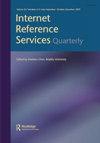Are Physical Libraries Popular for Research in the Internet Age Post COVID-19?
Q3 Social Sciences
引用次数: 2
Abstract
Abstract The study investigates if physical libraries are popular for research by students in the internet age post COVID-19. The study used a descriptive survey research design. The population consisted of 3457 Adeleke University undergraduates. Descriptive statistic was used to analyze data. The findings suggested that physical libraries are increasingly less popular among students for research purposes, owing mostly to the development of the internet era. Other reasons cited include physical library congestion and excessive surveillance, a preference to read with friends outside of the physical library, and a lack of motivation to visit the physical library. It was also discovered that students have a culture of completing their own research rather than paying professionals to do it for them. The study concluded that physical libraries are less popular for research among students, majorly due to the popularity of the internet. As a result, the study recommends that library management make physical libraries the strongest internet hub on campus, where all students would want to come for research. More efforts should be made to expand physical libraries and provide a variety of quiet reading options for those who detest crowds.新冠肺炎后互联网时代物理图书馆的研究流行吗?
摘要:本研究调查了在新冠肺炎疫情后的互联网时代,实体图书馆是否受到学生的欢迎。本研究采用描述性调查研究设计。人口包括3457名阿德利克大学本科生。采用描述性统计方法对数据进行分析。研究结果表明,由于互联网时代的发展,实体图书馆越来越不受学生的欢迎。其他原因包括实体图书馆拥挤、过度监控、喜欢在实体图书馆外与朋友一起阅读,以及缺乏访问实体图书馆的动力。研究还发现,学生们有一种自己完成研究的文化,而不是花钱请专业人士替他们做。该研究得出的结论是,由于互联网的普及,实体图书馆在学生中不太受欢迎。因此,该研究建议图书馆管理部门使实体图书馆成为校园中最强大的互联网中心,所有学生都愿意来这里进行研究。应该努力扩大实体图书馆,为那些讨厌拥挤的人提供各种安静的阅读选择。
本文章由计算机程序翻译,如有差异,请以英文原文为准。
求助全文
约1分钟内获得全文
求助全文
来源期刊

Internet Reference Services Quarterly
Social Sciences-Library and Information Sciences
CiteScore
2.40
自引率
0.00%
发文量
13
期刊介绍:
Internet Reference Services Quarterly tackles the tough job of keeping librarians up to date with the latest developments in Internet referencing and librarianship. This peer-reviewed quarterly journal is designed to function as a comprehensive information source librarians can turn to and count on for keeping up-to-date on emerging technological innovations, while emphasizing theoretical, research, and practical applications of Internet-related information services, sources, and resources. Librarians from any size or type of library in any discipline get the knowledge needed on how to best improve service through one of the most powerful reference tools available on the Internet.
 求助内容:
求助内容: 应助结果提醒方式:
应助结果提醒方式:


